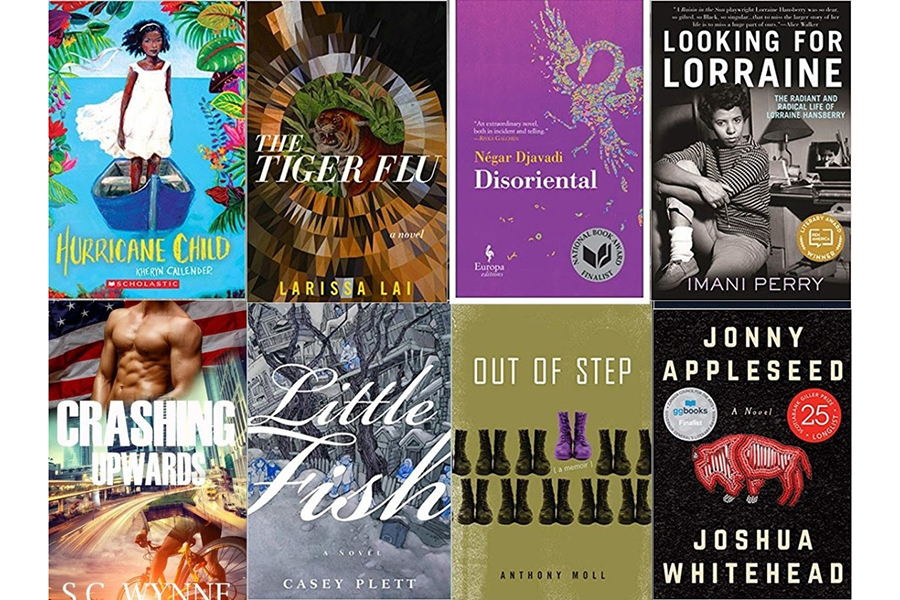The 31st Annual Lambda Literary Awards, the world’s largest LGBTQ ceremony of its kind, was held June 3 at the NYU Skirball Center for the Performing Arts in New York City. Lammys were awarded to 24 winners in categories that ranged from fiction and nonfiction to poetry and graphic novels.
The Lambda Literary Foundation is the nation’s leading nonprofit organization advancing LGBTQ literature.
According to organizers Sue Landers and Amy Scholder, 60 literary professionals served as judges this year, spending numerous hours on a record number of submissions. Finalists were chosen from at least 1,000 books submitted by more than 300 publishers.
“Once again, the winners of this year’s Lambda Literary Awards demonstrate how LGBTQ writing is far from monolithic,” said Landers. “Across 24 categories, one finds the range of queer brilliance and a whole new set of books for your to-read list.”
The Lammys were handed out at a ceremony hosted by Tony-nominated trans performer Mx Justin Vivian Bond, who is renowned for cabaret acts and has previously hosted the awards.
Along with the 25 book-award winners, special honors were awarded to authors Alexander Chee, Masha Gessen and Barbara Smith.
Alexander Chee received Lambda’s Trustee Award for his “immeasurable contributions” as a novelist, essayist, activist and teacher. Anthony Rapp presented Chee with his award on stage.
Masha Gessen, a Russia-American journalist and writer for the New Yorker, won the National Book Award for nonfiction in 2017 and, this year, received the Visionary Award for “their work advancing public awareness around the global threat of totalitarianism.” HuffPost editor-in-chief Lydia Polgreen presented the award.
Iconic lesbian feminist publisher and essayist Barbara Smith received the Publishing Professional Award for “a lifetime of work that has profoundly shaped our collective understanding of the interconnections between race, class, and gender.” The poet, educator and activist Cheryl Clarke presented Smith’s award.
Smith commented that queer women of color are finally getting mainstream book contracts and talked about how she had started the movement to publish women of color at her trailblazing Kitchen Table: Women of Color Press.
Among the winners was Philadelphia poet Raquel Salas Rivera, whose pronouns are they/them. Salas Rivera is the 2018-19 Poet Laureate of Philadelphia and, now, also the inaugural recipient of the Ambroggio Prize and the Laureate Fellowship, both from the Academy of American Poets. Their book, lo terciario/the tertiary, was on the 2018 National Book Award Longlist and won the Lammy for Transgender Poetry.
Several awards were won by trans authors, which one writer explained was indicative that more trans authors are writing across more genres and being recognized for their work.
“Given the sheer number of terrific LGBTQ books, it’s not at all uncommon for Lammy finalists to garner mainstream attention and accolades,” noted Landers. “But, yes, we have seen over the past few years, as trans visibility has increased and the general public’s understanding of trans lives has deepened, mainstream media has made some strides towards becoming more trans inclusive.”
Landers previously highlighted the volume of trans writers as a positive step toward inclusivity, saying, “This is due in no small part to all the work small, unheralded and independent trans centered presses have done for a long time, work that changed how we can and should view the queer literary canon. Of course, much work remains to be done to bring even more of these books into the world and to shine a light on them.”
There were some upsets. In the memoir/biography category, Darnell Moore won for his book “No Ashes in the Fire: Coming of Age Black and Free in America” over National Book Award winner Jeffrey Stewart’s biography of Philadelphian Alain Locke. Moore also won over Black Lives Matter activist Deray McKesson and his book “On the Other Side of Freedom: The Case for Hope.”
Imani Perry won in LGBTQ nonfiction category for her book, “Looking for Lorraine: The Radiant and Radical Life of Lorraine Hansberry.” Perry’s book was criticized in The New York Times by black gay playwright Branden Jacobs-Jenkins. Jacobs-Jenkins said he wished Perry “had more confidence” when writing about Hansberry’s queerness.
Roxane Gay won for her groundbreaking book in the LGBTQ anthology category with “Not That Bad: Dispatches from Rape Culture.”
Kheryn Callender said of the attention their middle-grade novel, “Hurricane Child,” which won for LGBTQ Children’s/Young Adult, “I really never dreamed that it would receive the level of love and support its gotten, which I’m so incredibly grateful for.”
Callender, who is from the U.S. Virgin Islands, said their book, about a queer girl of color in a Caribbean setting, is for “anyone who feels alone and isolated, and reads and feels empowered by Caroline Murphy and her journey to be herself — that she deserves to exist, and deserves to be happy, no matter what.”
The gay male romance category created some controversy, as all finalists were female. The winner, S.C. Wayne, self-published her book, “Crashing Upwards.”
The event raised $10,000 for Lambda. A full list of nominees and winners can be seen at LambdaLiterary.org.
